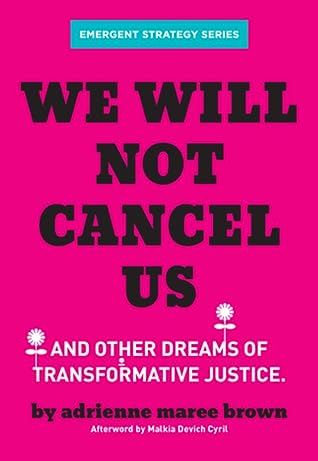More on this book
Community
Kindle Notes & Highlights
Read between
October 3 - October 4, 2021
low bar for entry and a high standard for conduct.
As I was writing the piece, part of my issue was that our collective response to…everything…is collapsed. Call outs elicit both a consistent negative and dismissive energy, and a pleasurable take-down activation, regardless of what the call out is addressing. It has started to feel like every kind of dissonance in movements is understood through a lens of violence, abuse, and victimization.
I am writing this in July 2020, from within the Covid-19 pandemic. As I have watched the world respond to the pandemic, the borders between nations shift meaning in my mind. I can see which countries choose life, and which don’t; which countries have a majority life-oriented citizenship, which countries/regions elect leaders who they believe will care for them;7 which countries pivot at the highest governmental level to protect their people, to guide their people to protect themselves—places with a variety of economies and exposure have found ways to move towards life. I
Instant judgment and punishment are practices of power over others. It’s what those with power do to those who can’t stop them, who can’t demand justice. This injustice of power is practiced at an individual and collective level.
Call outs are an incredible modern tool for those who are not committed to movements to use against those having impact.
We need to have the skills to be able to discern what kind of dissonance we are we dealing with or being asked to help with, what kind of support is actually needed, and the capacity we have to meet that need without calling on or informing the state.
I can’t help but wonder who benefits from movements that engage in public infighting, blame, shame, and knee-jerk call outs? I can’t help but see the state grinning, gathering all the data it needs, watching us weaken ourselves. Meanwhile, the conflicts are unresolved, and/or harm continues.
We need the people within our movements, all socialized into and by unjust systems, to be on liberation paths. Not already free, but practicing freedom every day. Not already beyond harm, but accountable for doing our individual and internal work to end harm and engage in generative conflict, which includes actively working to gain awareness of the ways we can and have harmed each other, where we have significant political differences, and where we can end cycles of harm and unprincipled struggle in ourselves and our communities.
a situation that is genuinely unsafe and one that is simply uncomfortable.
the difference between intolerable feelings and intolerable conditions.
For criminal legal violations that cannot be entrusted to the law, asymmetrical responses like call outs are exactly right.


